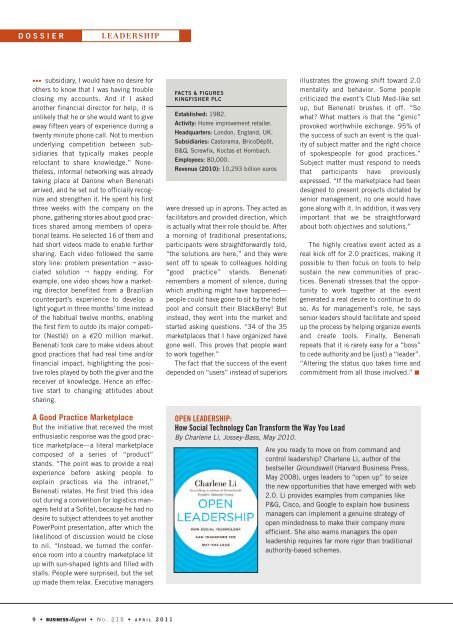Leadership@Infosys - Business Digest
Leadership@Infosys - Business Digest
Leadership@Infosys - Business Digest
Create successful ePaper yourself
Turn your PDF publications into a flip-book with our unique Google optimized e-Paper software.
D O S S I E R<br />
LEADERSHIP<br />
••• subsidiary, I would have no desire for<br />
others to know that I was having trouble<br />
closing my accounts. And if I asked<br />
another financial director for help, it is<br />
unlikely that he or she would want to give<br />
away fifteen years of experience during a<br />
twenty minute phone call. Not to mention<br />
underlying competition between subsidiaries<br />
that typically makes people<br />
reluctant to share knowledge.” Nonetheless,<br />
informal networking was already<br />
taking place at Danone when Benenati<br />
arrived, and he set out to officially recognize<br />
and strengthen it. He spent his first<br />
three weeks with the company on the<br />
phone, gathering stories about good practices<br />
shared among members of operational<br />
teams. He selected 16 of them and<br />
had short videos made to enable further<br />
sharing. Each video followed the same<br />
story line: problem presentation → associated<br />
solution → happy ending. For<br />
example, one video shows how a marketing<br />
director benefited from a Brazilian<br />
counterpart’s experience to develop a<br />
light yogurt in three months’ time instead<br />
of the habitual twelve months, enabling<br />
the first firm to outdo its major competitor<br />
(Nestlé) on a €20 million market.<br />
Benenati took care to make videos about<br />
good practices that had real time and/or<br />
financial impact, highlighting the positive<br />
roles played by both the giver and the<br />
receiver of knowledge. Hence an effective<br />
start to changing attitudes about<br />
sharing.<br />
A Good Practice Marketplace<br />
But the initiative that received the most<br />
enthusiastic response was the good practice<br />
marketplace—a literal marketplace<br />
composed of a series of “product”<br />
stands. “The point was to provide a real<br />
experience before asking people to<br />
explain practices via the intranet,”<br />
Benenati relates. He first tried this idea<br />
out during a convention for logistics managers<br />
held at a Sofitel, because he had no<br />
desire to subject attendees to yet another<br />
PowerPoint presentation, after which the<br />
likelihood of discussion would be close<br />
to nil. “Instead, we turned the conference<br />
room into a country marketplace lit<br />
up with sun-shaped lights and filled with<br />
stalls. People were surprised, but the set<br />
up made them relax. Executive managers<br />
9 • • N O . 2 1 5 • A P R I L 2 0 1 1<br />
FACTS & FIGURES<br />
KINGFISHER PLC<br />
Established: 1982.<br />
Activity: Home improvement retailer.<br />
Headquarters: London, England, UK.<br />
Subsidiaries: Castorama, BricoDépôt,<br />
B&Q, Screwfix, Koctas et Hornbach.<br />
Employees: 80,000.<br />
Revenue (2010): 10,293 billion euros<br />
were dressed up in aprons. They acted as<br />
facilitators and provided direction, which<br />
is actually what their role should be. After<br />
a morning of traditional presentations,<br />
participants were straightforwardly told,<br />
“the solutions are here,” and they were<br />
sent off to speak to colleagues holding<br />
“good practice” stands. Benenati<br />
remembers a moment of silence, during<br />
which anything might have happened—<br />
people could have gone to sit by the hotel<br />
pool and consult their BlackBerry! But<br />
instead, they went into the market and<br />
started asking questions. “34 of the 35<br />
marketplaces that I have organized have<br />
gone well. This proves that people want<br />
to work together.”<br />
The fact that the success of the event<br />
depended on “users” instead of superiors<br />
OPEN LEADERSHIP:<br />
How Social Technology Can Transform the Way You Lead<br />
By Charlene Li, Jossey-Bass, May 2010.<br />
illustrates the growing shift toward 2.0<br />
mentality and behavior. Some people<br />
criticized the event’s Club Med-like set<br />
up, but Benenati brushes it off. “So<br />
what? What matters is that the “gimic”<br />
provoked worthwhile exchange. 95% of<br />
the success of such an event is the quality<br />
of subject matter and the right choice<br />
of spokespeople for good practices.”<br />
Subject matter must respond to needs<br />
that participants have previously<br />
expressed. “If the marketplace had been<br />
designed to present projects dictated by<br />
senior management, no one would have<br />
gone along with it. In addition, it was very<br />
important that we be straightforward<br />
about both objectives and solutions.”<br />
The highly creative event acted as a<br />
real kick off for 2.0 practices, making it<br />
possible to then focus on tools to help<br />
sustain the new communities of practices.<br />
Benenati stresses that the opportunity<br />
to work together at the event<br />
generated a real desire to continue to do<br />
so. As for management’s role, he says<br />
senior leaders should facilitate and speed<br />
up the process by helping organize events<br />
and create tools. Finally, Benenati<br />
repeats that it is rarely easy for a “boss”<br />
to cede authority and be (just) a “leader”.<br />
“Altering the status quo takes time and<br />
commitment from all those involved.” ■<br />
Are you ready to move on from command and<br />
control leadership? Charlene Li, author of the<br />
bestseller Groundswell (Harvard <strong>Business</strong> Press,<br />
May 2008), urges leaders to “open up” to seize<br />
the new opportunities that have emerged with web<br />
2.0. Li provides examples from companies like<br />
P&G, Cisco, and Google to explain how business<br />
managers can implement a genuine strategy of<br />
open mindedness to make their company more<br />
efficient. She also warns managers the open<br />
leadership requires far more rigor than traditional<br />
authority-based schemes.


